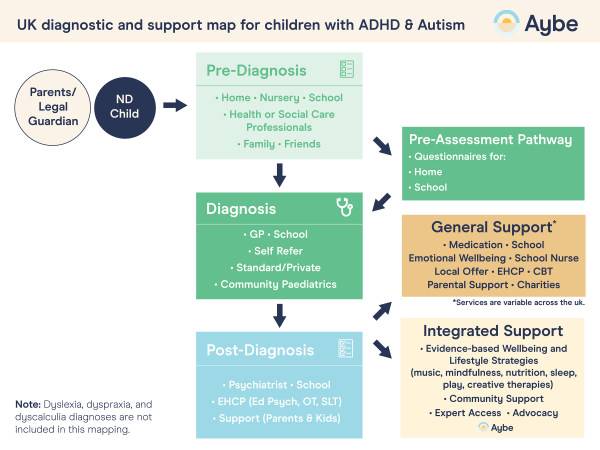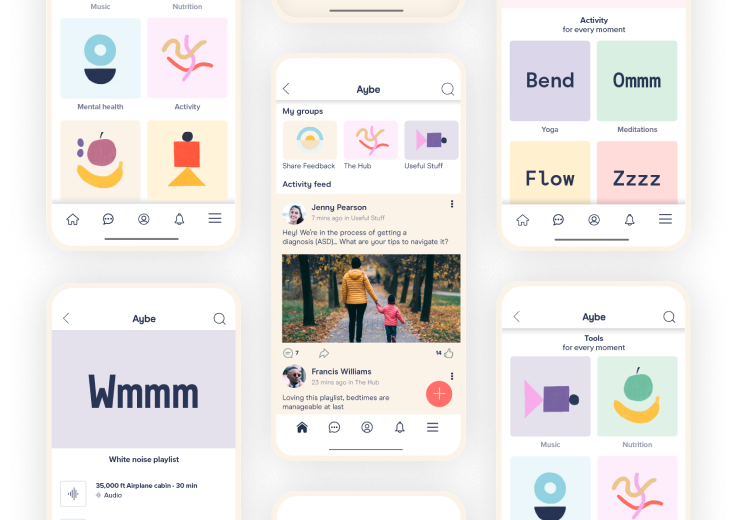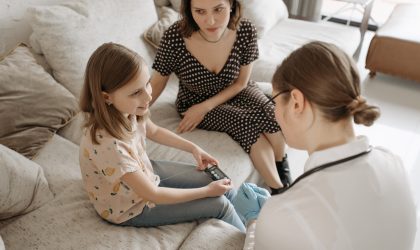What Support is Available After an Autism & ADHD Diagnosis in the UK

Are you looking to get support for autism or ADHD diagnosis in the UK? Have a look at a snapshot of the general and integrated support that is available. You will discover support that you may be entitled to but not informed about.
We co-created a diagnostic and support map for children with ADHD & Autism in the UK with Dr Joanne Steer, which shows you the the journey parents or guardians tend to take to obtain diagnosis and support for their neurodivergent children in the UK.
This is a general map and many local areas have specific nuances in how their services are provided.

UK diagnostic and support map for children with ADHD & autism, co-developed by Dr Joanne Steer, Consultant Clinical Psychologist, and Dr Samantha Hiew
Join the Community
Download the app to access more specialist advice, community support and wellbeing tools.
Join today as a Contributor member to gain free* access!
Download now
*Free access, in return for contributing to Aybe on a weekly basis, for example by commenting, liking, responding to feedback requests. See Terms & Conditions.

Support for Your Child and You After Diagnosis
Following diagnosis, the priority should be to support the network around the child (parents, extended family, school). This should include the child themselves understanding their diagnosis. It is important for them to have access to high quality information about the diagnosis. Some children diagnosed with ADHD may be prescribed medication by a psychiatrist. Additional needs-based and emotional wellbeing (ELSA, or Emotional Literacy Support Assistant) support could be given by the school to help children thrive.
In cases where children need extra support for their education, healthcare and social care needs, they would need to apply for the EHCP (Education and Health Care Plan). This is usually best done in discussion with the school SEN department. An EHC needs assessment would commence if the child is deemed eligible, where the Local Authority (LA) would then work with the Educational Psychologist (Ed Psych).
The LA may also seek advice from a SLT, Occupational Therapist (OT), Physiotherapist or CAMHS. Support groups, parenting courses, family therapy, Cognitive Behavioural Therapy (CBT) may also be available to parents and children. Early Help and Social Care is also available from the LA for parents and their children who require additional support and meet their threshold criteria. Parents can search for the “Local Offer” to find out what is available locally. This lists all the support for all children with special education needs in their area.
All Round Lifestyle Strategies to Improve Your Child’s Wellbeing
As parents become more aware and empowered about neurodivergence and holistic lifestyle strategies to manage ADHD, autism/ ASC, dyslexia, dyspraxia, dyscalculia and other learning differences, they may seek integrated health support for their children and themselves.
Beginning in pre-diagnosis while navigating the challenges in seeking understanding for their children to post-diagnosis integrated health support. Post-diagnosis support such as music, mindfulness, yoga, nutrition, sleep, play, and creative therapies are essential. They help improve well-being, relieve stress, and build in helpful habits for neurodivergent children and their families.
Aybe offers multidisciplinary evidence-based wellbeing, lifestyle, community and advocacy support.
Have a look at our large array of wellbeing tips aimed at supporting children and parents through their neurodivergent journey.
Ever wondered why it is more acceptable to refer to the broader continuum of autism as ASC instead of ASD? If you need more support, do a deep dive into our recommended resources for other neurodiverse conditions. Have you tried our free Music play list?
Join the Community
Download the app to access more specialist advice, community support and wellbeing tools.
Join today as a Contributor member to gain free* access!
Download now
*Free access, in return for contributing to Aybe on a weekly basis, for example by commenting, liking, responding to feedback requests. See Terms & Conditions.






